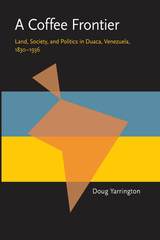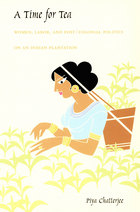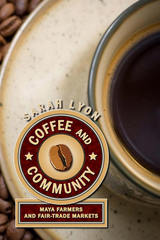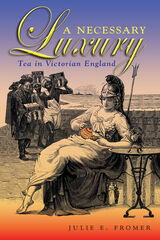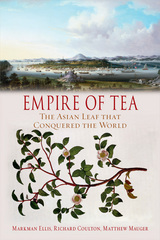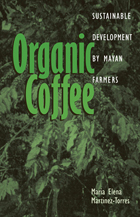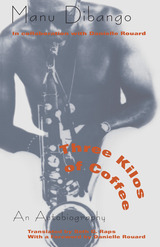Coffee & TeaCollection by Cassandra Verhaegen (7 items)For reading with your favorite hot or iced beverage. Includes the following tags:
1933-, 1933-2020, Agriculture & Food, Autobiography, Coffee, Coffee industry, Community, Competition, Unfair, Guatemala, Jazz musicians, Land, Tea, Tea trade, Victorian England
See More
|
A Coffee Frontier
by Douglas Yarrington
University of Pittsburgh Press, 1998
This study views the economic transformation of Duaca, Venezuela into a major coffee export center in the late nineteenth century. Yarrington examines the rise of the peasantry to prosperity, yet they later lost their stature as the local elite allied itself with the state to restructure society and coffee production on its own terms in the twentieth-century. The book is a pioneering study on peasant studies, export-led development, the relationship of state and society, and the consolidation of nation-states in Latin America.
1
|
A Time for Tea
by Piya Chatterjee
Duke University Press, 2001
In this creative, ethnographic, and historical critique of labor practices on an Indian plantation, Piya Chatterjee provides a sophisticated examination of the production, consumption, and circulation of tea. A Time for Tea reveals how the female tea-pluckers seen in advertisements—picturesque women in mist-shrouded fields—came to symbolize the heart of colonialism in India. Chatterjee exposes how this image has distracted from terrible working conditions, low wages, and coercive labor practices enforced by the patronage system. Allowing personal, scholarly, and artistic voices to speak in turn and in tandem, Chatterjee discusses the fetishization of women who labor under colonial, postcolonial, and now neofeudal conditions. In telling the overarching story of commodity and empire, A Time for Tea demonstrates that at the heart of these narratives of travel, conquest, and settlement are compelling stories of women workers. While exploring the global and political dimensions of local practices of gendered labor, Chatterjee also reflects on the privileges and paradoxes of her own “decolonization” as a Third World feminist anthropologist. The book concludes with an extended reflection on the cultures of hierarchy, power, and difference in the plantation’s villages. It explores the overlapping processes by which gender, caste, and ethnicity constitute the interlocked patronage system of villages and their fields of labor. The tropes of coercion, consent, and resistance are threaded through the discussion. A Time for Tea will appeal to anthropologists and historians, South Asianists, and those interested in colonialism, postcolonialism, labor studies, and comparative or international feminism. Designated a John Hope Franklin Center book by the John Hope Franklin Seminar Group on Race, Religion, and Globalization.
2
|
Coffee and Community
by Sarah Lyon
University Press of Colorado, 2010
We are told that simply by sipping our morning cup of organic, fair-trade coffee we are encouraging environmentally friendly agricultural methods, community development, fair prices, and shortened commodity chains. But what is the reality for producers, intermediaries, and consumers? This ethnographic analysis of fair-trade coffee analyzes the collective action and combined efforts of fair-trade network participants to construct a new economic reality.
Focusing on La Voz Que Clama en el Desierto-a cooperative in San Juan la Laguna, Guatemala-and its relationships with coffee roasters, importers, and certifiers in the United States, Coffee and Community argues that while fair trade does benefit small coffee-farming communities, it is more flawed than advocates and scholars have acknowledged. However, through detailed ethnographic fieldwork with the farmers and by following the product, fair trade can be understood and modified to be more equitable. This book will be of interest to students and academics in anthropology, ethnology, Latin American studies, and labor studies, as well as economists, social scientists, policy makers, fair-trade advocates, and anyone interested in globalization and the realities of fair trade. Winner of the Society for Economic Anthropology Book Award
3
|
A Necessary Luxury
by Julie E. Fromer and Julie E. Fromer
Ohio University Press, 2008
Tea drinking in Victorian England was a pervasive activity that, when seen through the lens of a century’s perspective, presents a unique overview of Victorian culture. Tea was a necessity and a luxury; it was seen as masculine as well as feminine; it symbolized the exotic and the domestic; and it represented both moderation and excess. Tea was flexible enough to accommodate and to mark subtle differences in social status, to mediate these differences between individuals, and to serve as a shared cultural symbol within England.
4
|
Empire of Tea
by Markman Ellis, Richard Coulton and Matthew Mauger
Reaktion Books, 2015
Although tea had been known and consumed in China and Japan for centuries, it was only in the seventeenth century that Londoners first began drinking it. Over the next two hundred years, its stimulating properties seduced all of British society, as tea found its way into cottages and castles alike. One of the first truly global commodities and now the world’s most popular drink, tea has also, today, come to epitomize British culture and identity. This impressively detailed book offers a rich cultural history of tea, from its ancient origins in China to its spread around the world. The authors recount tea’s arrival in London and follow its increasing salability and import via the East India Company throughout the eighteenth century, inaugurating the first regular exchange—both commercial and cultural—between China and Britain. They look at European scientists’ struggles to understand tea’s history and medicinal properties, and they recount the ways its delicate flavor and exotic preparation have enchanted poets and artists. Exploring everything from its everyday use in social settings to the political and economic controversies it has stirred—such as the Boston Tea Party and the First Opium War—they offer a multilayered look at what was ultimately an imperial industry, a collusion—and often clash—between the world’s greatest powers over control of a simple beverage that has become an enduring pastime.
5
|
Organic Coffee
by Maria Elena Martinez-Torres and Maria Elena Martinez-Torres
Ohio University Press, 2006
Despite deepening poverty and environmental degradation throughout rural Latin America, Mayan peasant farmers in Chiapas, Mexico, are finding environmental and economic success by growing organic coffee. Organic Coffee: Sustainable Development by Mayan Farmers provides a unique and vivid insight into how this coffee is grown, harvested, processed, and marketed to consumers in Mexico and in the north.
6
|
Three Kilos of Coffee
by Manu Dibango and Danielle Rouard
translated by Beth G. Raps University of Chicago Press, 1994
In 1948, at the age of fifteen, Manu Dibango left Africa for France, bearing three kilos of coffee for his adopted family and little else. This book chronicles Manu Dibango's remarkable rise from his birth in Douala, Cameroon, to his worldwide success—with Soul Makossa in 1972—as the first African musician ever to record a top 40s hit. Composer, producer, performer, film score writer and humanitarian for the poor, Manu Dibango defines the "African sound" of modern world music. He has worked with and influenced such artists as Art Blakey, Don Cherry, Herbie Hancock, Harry Belafonte, Paul Simon, and Johnny Clegg. In Africa, he has helped younger musicians, performed benefit concerts, and transcribed for the first time the scores and lyrics of African musicians. The product of a "mixed marriage" (of different tribes and religions) who owes allegiances to both Africa and Europe, Dibango has always been aware of the ambiguities of his identity. This awareness has informed all of the important events of his life, from his marriage to a white Frenchwoman in 1957, to his creation of an "Afro-music" which joyfully blends blues, jazz, reggae, traditional European and African serenades, highlife, Caribbean and Arabic music. This music addresses the meaning of "Africanness" and what it means to be a Black artist and citizen of the world. This lively and thoughtful memoir is based on an extensive set of interviews in 1989 with French journalist Danielle Rouard. Richly illustrated with photographs, this book will be a must for readers of jazz biographies, students of African music and ethnomusicology, and all those who are lovers of Manu Dibango's unique artistry and accomplishments.
7
|
| Click here to go to the beginning. | |||||||
